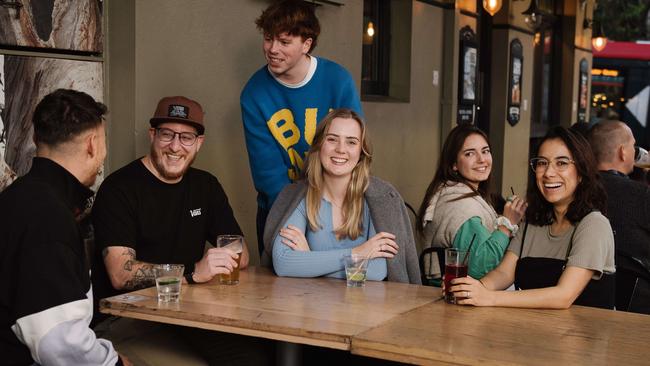How Sydney’s working week became a long weekend
The Covid-era work from home trend has cemented itself into Sydney’s working patterns, with one in five workers failing to show up at the office on Mondays and Fridays, figures show.

A gentle slide into the working week – or perhaps a slightly longer weekend – has cemented itself into Sydney’s commuting patterns, analysis of Opal tap-off data shows.
Between 5am and 12pm, some 20 per cent fewer people tap off in the CBD on Mondays and Fridays compared to Tuesdays, Wednesdays and Thursdays, analysis of Transport NSW data shows.
While there has been a 30 per cent increase in the average number of weekday Opal card tap-offs in the Sydney CBD since last year, that growth has now plateaued.
Australian Industry Group chief Innes Willox said there was a “stubborn cohort of workers … refusing to turn up at all or who barely put in an appearance” and Fridays were especially quiet.
On average, about 180,000 people tap off at Sydney CBD train stations on Tuesday, Wednesday and Thursday mornings, up from 130,000 at this time last year.
Some 140,000 people tap off on Monday and Friday mornings, up from around 110,000 people this time last year.
The accompanying chart shows that most of the growth in these values took place in the first three months this year and has stayed largely flat since.
Recent ANZ research found working from home had led to lower CBD spending.
“Work from home has impacted many businesses; in-store CBD spending is 32 per cent lower than before Covid,” it said. “In contrast, spending in the suburbs is down only 5 per cent relative to August 2019.
“The weakness is particularly acute in Canberra, Darwin and Sydney CBDs.”
A growing number of major employers has required more office days from employees: Commonwealth Bank in July told its office workers to spend at least half of their working hours in the office and Zoom, the service that became the verb for Covid-era video calls, demanded its employees return to the office.
“Employers are reporting increasing frustration and concern at difficulties enticing their white collar workforce back to the office on a more regular basis,” Mr Willox said. “Employers are worried about their cultures and relationships with staff and worry that a two-speed workforce is developing. Since those who don’t turn up aren’t as noticeable as those who do, employers increasingly report that turn-up rates are increasingly impacting decisions around promotions and compensation.
“There is no doubt that turn-up rates have largely plateaued. Tuesday, Wednesday and Thursday are busier days but employers report they struggle to get more than 40 per cent turn up.”
Australian Chamber of Commerce and Industry workplace relations director Jessica Tinley told The Weekend Australian there was “undeniable value in the energy the office environment provides”.
“While employers understand the appeal of remote work, many businesses argue an onsite presence drives higher productivity and collaboration,” she said.
“Amidst a fierce competition for talent, businesses must balance employee desires for flexibility with the tangible benefits of in-house teamwork and immediate feedback.”
This trend has reshaped the time-honoured tradition of end-of-week drinks, said Surry Hills pub Dove & Olive manager Angie. “We’ve got more bookings tonight than tomorrow,” she said on Thursday.
She said Thursday and Friday patrons tended to be different: “You get more office workers coming in on Thursday” whereas the Friday crowd usually stayed later into the night.
Among that night’s patrons were Manon and Pia, out drinking with colleagues before everyone retreated to their homes for the day afterwards to work. “It’s easier to finish and start the week from home,” Manon said.
“We tend to plan social things on Wednesdays and Thursdays,” Pia said, because those were days people reliably came to the office.








To join the conversation, please log in. Don't have an account? Register
Join the conversation, you are commenting as Logout